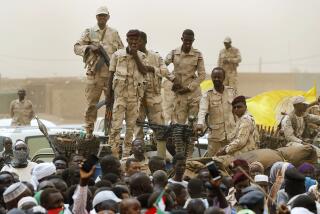Sanctions Squeeze Iraqis--Not Hussein
- Share via
TREBIL, Iraq — It was after 2 a.m. one recent night at this remote border crossing. But the hour didn’t stop Jordanian border policemen from tearing an Iraqi tour bus apart.
They opened every suitcase, searched every passenger, popped open hidden compartments, confiscated new tires, threw off a carton of watches, impounded a new car battery and stripped the entire bus of all but its most basic parts.
The severe searches at the Trebil border crossing represent the latest victory in a U.S.-led crusade to so cripple Iraqi President Saddam Hussein’s military machine through trade sanctions that it never again will be able to threaten its neighbors with invasion or nuclear war. The police searching the Iraqi tour bus represent a nation that was among Baghdad’s strongest sympathizers during the 1991 war against Iraq.
In recent interviews and public statements, Jordan’s King Hussein has gone further, calling on the Iraqi people to force their regime to make reforms in hopes such action will help stabilize a troubled region.
The Jordanian monarch’s about-face in dealing with his neighbor is motivated by a combination of popular sentiment at home and intense pressure from an Administration in Washington that froze all U.S. aid to Jordan.
In the conspiratorial theater that is Iraq these days, unconfirmed reports and rumors abound of a variety of other strategies and tactics that Western intelligence agencies allegedly have employed in the allied crusade to erode Hussein’s support from within.
Many such reports center on U.S. financial backing for dissident Kurds in northern Iraq and Shiites in the south. Both regions are under the protective umbrella of allied air patrols and an effective ban on all Iraqi military aircraft, and the Iraqi regime is convinced that dissident leaders are “living off the plate of the CIA.”
In “free Kurdistan,” for example, where Iraqi Kurdish guerrillas drove out Hussein’s forces and elected their own leadership after the war, Kurdish sources said they believe the United States is covertly financing three radio stations and five television stations with broadcasts aimed at destabilizing the regime.
“It’s a great idea,” said one dissident. “Just one problem: Not only can’t we pick up these stations in Baghdad, but the signal isn’t even strong enough to reach the main Kurdish cities that remain in the regime’s hands just across the border.”
Iraqi dissidents sneered as well at a new democratic shadow government appointed during a meeting of Iraqi opposition groups earlier this month.
“This is a joke, a paper government,” said the Iraqi Kurd who complained about being unable to receive the Free Kurdistan broadcasts. “How are they going to come to Baghdad? This guy (Hussein) is surrounded by circle inside circle inside circle inside circle of troops. . . .
“So what’s the alternative? Start a civil war? If you thought Lebanon was bad, if the world is worried about Bosnia, just watch what happens if you take the lid off Iraq. Shiites will kill Sunnis, both will kill Kurds, clans will kill clans. And believe me, everybody here now has a gun.”
Part of the Iraqi regime’s strategy to counter destabilization efforts has involved the mass distribution of AK-47 assault rifles to loyal clans and tribes, according to several sources.
The threat of civil war and the disintegration of a largely secular nation that is home to the world’s second-largest oil reserves have checked any ambitious effort to remove Hussein by force, according to analysts. On the other hand, allied sanctions have forced Hussein’s regime to take Draconian economic steps that, in effect, have aided the allied destabilization effort.
In a move to micro-manage his economy, Hussein last summer approved the execution of 42 prominent merchants who were accused of price gouging, and he confiscated all their money and property, alienating many in Iraq’s ailing middle class.
This week, a regime deadline approaches that could hurt the merchant class even more. On Friday, a ban takes effect on the sale of 157 imported consumer items that the traders had stockpiled--items ranging from heavy appliances and television sets to clothing and ketchup. So the merchants have been forced to sell at enormous losses in the weeks leading up to the prohibition.
The new policy is meant to force the traders to use their assets for basic food imports rather than luxury goods, but most said it will only fuel resentment toward the regime.
“But none of this will translate into the fall of Saddam,” said another Iraqi dissident. “I’m afraid the best the Americans can hope for is to keep a lid on Saddam while the Iraqi people pay the price--suffering from the sanctions, suffering from the regime and living with less hope each day.”
More to Read
Sign up for Essential California
The most important California stories and recommendations in your inbox every morning.
You may occasionally receive promotional content from the Los Angeles Times.













